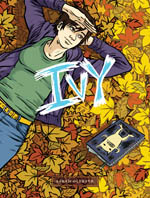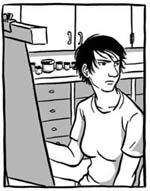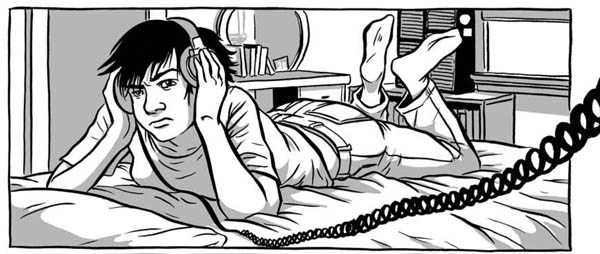 By Sarah Oleksyk
By Sarah Oleksyk
224 pages, black and white
Published by Oni Press
I’ve become a convert to Sarah Oleksyk. Her story in Papercutter #4 was a stand-out in an already-strong comic, and likewise her contribution to I Saw You… was one of the stories worth seeking out. So with all that in mind, her first graphic novel Ivy was a must-read. I’d seen some early chapters in mini-comic form, but it had been long enough that in many ways this was a new experience. And by the time I was done, I couldn’t help but feel that Oleksyk had made a book that should have turned me off, but instead kept pulling me in.
 The main character of Ivy is, at her heart, not the most likeable of people. She’s got a scowl on her face more often than not. Aside from her two core friends, she doesn’t really interact with people. She’s prone to erupt into shouting jags about people that she’s decided are clearly out to get her. And at least one of her teachers has clearly had enough with Ivy, to boot. In short? She’s the kind of person who feels the world is out to get her, and carries a massive chip on her shoulder about it.
The main character of Ivy is, at her heart, not the most likeable of people. She’s got a scowl on her face more often than not. Aside from her two core friends, she doesn’t really interact with people. She’s prone to erupt into shouting jags about people that she’s decided are clearly out to get her. And at least one of her teachers has clearly had enough with Ivy, to boot. In short? She’s the kind of person who feels the world is out to get her, and carries a massive chip on her shoulder about it.
But despite all of these flaws, there’s something about Ivy which made me want to keep reading her story. Sure, she’s less than perfect (and then some) but in those rare moments when her guard is down, Oleksyk lets us see the other side of the character; a talented artist, a thoughtful person, someone who is ready to fall in love. She’s so angry and guarded that it’s hard to imagine it ever happening; after all, this is someone who can barely even understand or appreciate when people are on her side and trying to help out. But of course, it’s a field trip to an art college fair that turns her life upside down once she meets Josh. And what we get then is, well, one of the best depictions of young love that I’ve read in a while, from the first flash of interest to the moment that reality truly sets in.

"I imagined all the best parts of you," Ivy says towards the conclusion of the book, "wish I could do that for myself." It’s one of the strongest moments in the book, perhaps because it’s even more apt now than it was in the unspecified earlier time period of Ivy. (Pay phones are still everywhere, and there’s no sign of cell phones or the internet, so at a guess it’s sometime in the 1980s.) So often people read a profile of someone else and instantly create an entire relationship between them. ("We both love Farscape and ice hockey, it was clearly meant to be and we’ll be together forever!") But of course, such a thing happened even before the internet made those pitfalls that much easier to step into. Even as Ivy burns her bridges one-by-one in favor of her new crush Josh, you can see the disaster looming on the horizon, perhaps because you’ve been in that position yourself. It’s frustrating to read, even as you find yourself cheering for the Ivy that sometimes is self-aware enough to apologize to her friends when she’s just burned them, rather than act oblivious.
As for the rest of the story, well, I appreciate that Oleksyk ties up some parts of Ivy neatly but (just like real life) leaves some other threads hanging. There’s enough present in Oleksyk’s script that you can see those remaining pieces eventually getting dealt with in Ivy’s life, though, something that the earlier queen of avoidance would have never done. She’s more aware of both herself and her surroundings when the book comes to a close, and it ultimately makes reading about her low points worth it.

The art in Ivy is a strong selling point for the book; from the moment you first see Ivy’s scowl on her face in art class, you get a strong feeling for her character and what’s going through her head. A lot of careful detail is put into just about everything, from the huge range of emotions that run over everyone’s faces, to Ivy’s occasional daydreams where she imagines a better life for herself. Something as simple as Brad’s cringe of pain and embarrassment as Ivy starts yelling at her teacher is fantastic, as you can see his conflict on wanting Ivy to succeed and to just stop in that single moment. Oleksyk’s art in general is a beautiful style, one that isn’t afraid to play with some of the smaller details without drawing attention to themselves. I love the fish-eye lens that Ivy’s dream of hopping a train is shown through, for instance, or how the spiral cord on her headphones curls and pulls up and out of the panel to the edge of the page, plugging into an unseen stereo.
When Ivy came to a conclusion, I felt like I’d just finished a long run as I exhaled a breath I didn’t know I was holding. As up and down as the story goes (for Ivy), the book itself is remarkably consistent in drawing you in and making you care about a character that in real life you might avoid. Watching Ivy grow up is, in the end, a pleasurable experience and one that is worth the journey. After reading Oleksyk’s Papercutter story I’d already put her on the "must read" category, but Ivy has cemented her position there. This is a book that was well worth the wait.
Purchase Links: Amazon.com | Powell’s Books
